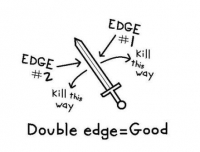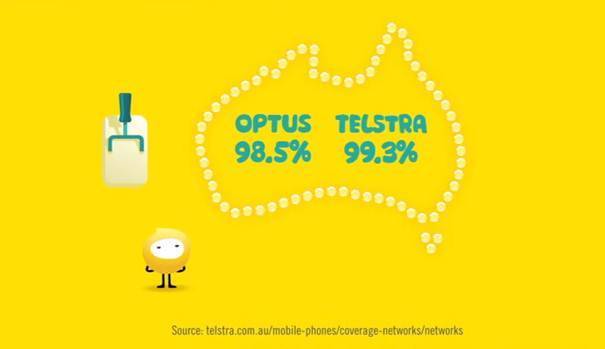Double-edged sword

Why?
We’re all consumers. In fact, we’re megaconsumers compared to ourselves some 10 years ago and are nowhere close to ourselves in just a half-decade from now. Next time you, while having your beer in a good company, are about to start a conversation along the lines of ‘my old <insert your most favourite brand name> is well worth two of your <insert a lesser favourite brand name>’, have another sip before and think what is that that’s causing you to say so. Is it your personal experience or is it someone else’s or maybe your TV commercial made you think so? Recently in Australia’s media there’s been a bit of a kerfuffle which was caused by the two biggies of the Telecom market - Optus and Telstra. The thing is - Optus released an ad with two numbers alongside each other - 98.5% Vs 99.3%.

Long story short, the supreme court ruled to stop the campaign due to its misleading content. As one might have thought by glancing at the map of Australia with the two figures in it, it’s not actually comparing the network coverage of the two rivaling companies; instead these percentages were meant to compare the country’s population covered by each of these network.
I took the liberty of slightly altering the pic while (as I convinced myself to believe) keeping the idea intact.

Hmmm… Okay, I failed the ‘keep the idea intact’ part.
This is the wild world of comparative advertising. Where the stakes are high and brands are allowed to openly compare themselves against their competitors’ products. Funnily enough, my quick research showed that this is allowed pretty much everywhere across the globe these days and the idea itself has quite a history - the first recorded case was in the US of A in 1910 and pretty much every big brand there is and was has had an go at their rivals through their ads - Mac and PC, Coca-Cola and Pepsi, Microsoft and Google, Teradata and Oracle. Openly.
Comparative advertising is an uncommon technique, mainly because of the inherent risk of being sued, due to the fact that in many countries there is no strict legislation defining what’s allowed and where’s that line that should not be crossed - for instance, Russia’s and Australia’s laws on the matter are quite vague. And there’s simply no guarantee that your ad stating that ‘...our pillows are 5% softer than the PillowCo ones’ will work just because your competitor gets their brand attention figures upped as well. Be damned those swords that cut both ways.
-Igor-

|
Know-it-all IT geek with some spectacular CRM, MDM and Loyalty implementations for Tier-1 Telecoms, Banks and Insurance companies across Europe and Australia. PMP and PRINCE2 certified. |
Eight key ingredients to craft the perfect media release
August 25, 2014Medianet have come up with a great recipe of a perfect media release
Audience Insights for Facebook Advertising
May 13, 2014Facebook launches a new marketing instrument - Audience Insights.
Aston Martin Announced an Unusual Deal
May 12, 2014Being a celebrity means that you are always opened for advertising opportunities. You may get paid for wearing Lacoste dress to the Coachella Festival or become a member of the coolest Nike society or launch your own perfume line - or you can be James Bond.
"I Am Looking @ You, Spencer!"
May 11, 2014Yes, you need to have the guts to quit your job. Especially when you don’t have a new one.

